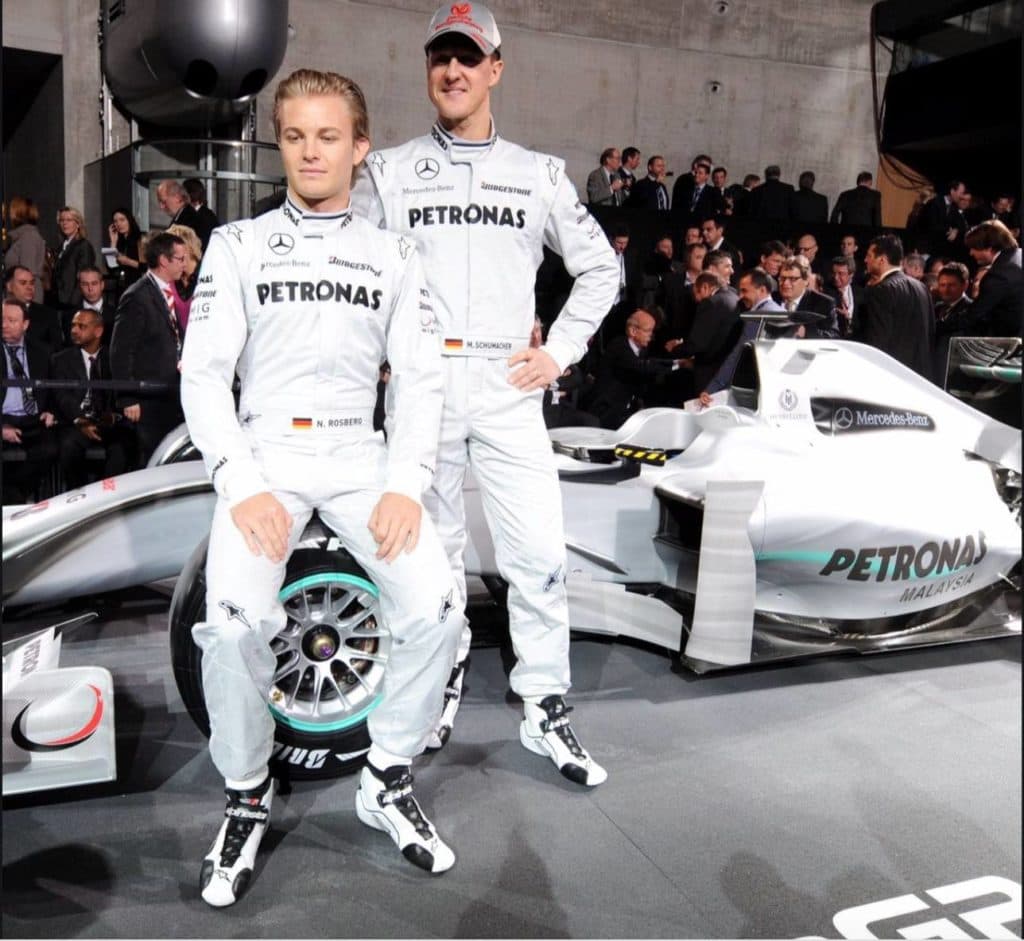At the time of the presentation of the new F1 Mercedes, there were many who let their time machine go back ten years.
Ten years ago, the Mercedes Museum in Stuttgart-Untertürkheim was filled to the last seat. The employees had polished the eyewitnesses from the legendary Silver Arrow history for a week. Carraciola’s racing car from the 30s, Fangio’s car from the 50s – they should all form the dazzling framework for what should come now, for Mercedes glorious future.
When the then Daimler boss Dieter Zetsche took the stage, it suddenly became quiet. The PhD. proudly presented, Z., as he’s called by the subordinates, a mixture of respect and familiarity, the first Mercedes factory team since 1955.
The native of Istanbul had styled his mustache even more than usual to coax a sentence that put pressure on Mercedes just as much like football emperor Franz Beckenbauer in 1990. At that time, the just resigned team boss of the national team announced fervently: “Unification will make Germany unbeatable for years to come.” Zetsche’s vision for Mercedes was similar: “Mercedes is now the German national team in Formula 1.”
The captain builder of motorsport should be the captain, playmaker, and scorer: Michael Schumacher. With the help of his new team boss Ross Brawn, Zetsche had persuaded the record world champion at the last race in Abu Dhabi in 2009.
And, above all, he convinced him to make his Formula 1 comeback at Mercedes – at the brand who started his unique career as a junior in 1990. With the brand, without the myth of the native Rhinelander would never have existed.
Schumi comeback for Mercedes
At the Schumi comeback, when he entered the stage, all the cameras were pointed at him. At times the flashlights dazzled him so strongly that he narrowed his eyes to look for familiar faces in the crowd. His young teammate Nico Rosberg who was hardly noticed, also German, stood in the shadow of the enlightened Schumacher. It was an important moment for German motorsport and especially for Mercedes.
Because for the first time, you had the impression that the numerous Mercedes employees – otherwise quite critical of the Group’s devouring Formula 1 commitment – watched the presentation proudly because they saw themselves as part of a legendary team.
Going forward ten years, we are smarter. Not much was left of the announced national team. Above all, the expected success did not materialize in the 3 years in which Schumacher’s was at the helm of the luxury tanker – called Mercedes F1 team.
In December 2011, Lewis Hamilton contacted Mercedes. The Brit still felt connected to Mercedes, despite separating from McLaren a year earlier. Mercedes had supported him even at the time of karting, and the Briton attributed his 2008 world championship not least to the fact that Mercedes built the best engine in Formula 1 and also helped with car innovations with technical innovations from the McLaren group.
Hamilton wished them Merry Christmas and asked about his chances of driving at Mercedes in 2013. He no longer felt comfortable with McLaren, could no longer imagine a long-term partnership with his mentor Ron Dennis and was looking for a new challenge.
The then motorsport director Norbert Haug immediately informed Dieter Zetsche. For the CEO, Lewis Hamilton seemed like a Christmas present: Because with him, who was considered a guarantee of victory among the experts, the annoying supervisory board in Germany could be enthusiastic about Formula 1 again. In Hockenheim at the 2012 German GP, Mercedes’ home race, the decision was finally made for Hamilton and against Schumacher.
Dieter Zetsche grumpily left the Motodrom before the checkered flag fell. Once again, the result was disappointing. Michael Schumacher was only seventh. Rosberg only tenth. In addition: Schumacher had failed to keep up with the plans of the group. He still left it open whether he wanted to continue or end his career.
Schumi underestimated the precarious situation. He was blind to business and only slowly realized in Monza what dangers Hamilton posed. He only learned of the final decision from Ecclestone’s interview to the press. The Supervisory Board approved the proposals in a meeting two days later. After that, the deal with the British could be announced. Michael Schumacher was out.
Ten years later it is clear that Zetsche’s vision of the German national team was history. Most Daimler employees hardly identify with the six World Cup titles, of which Hamilton contributed five.
Except for the Mercedes star, which is still emblazoned on the silver cars, there’s nothing left that reminds of its roots.
The factory is in England, no driver comes from Germany. Even the Swabian warhorse Norbert Haug’s replaced by the Austrian Toto Wolff. He’s the face of motorsport involvement for two decades and thus conveyed the corresponding stable smell.
Wolff conveys the opposite of Haug: internationality, slick agility and – especially in its own sense – ambitious business acumen. Unfortunately, he is not suitable as an identification figure for Daimler workers who once made the company big. Despite his success.
Wolff was brought on, in addition to Niki Lauda, who was made a consultant as a result of the Schumacher and Haug disposal. Wolff’s also considered the father of the six World Cup titles in a row. Nobody thinks of Schumacher anymore. Except for one: Ross Brawn.
The Briton, who‘s responsible for five world championships with Ferrari as Schumacher’s technical director, brought Schumacher back to Mercedes. And later fell victim to the palace revolution around Wolff and Lauda.
Like Haug, he is convinced: “Michael has a large share in the success. A very big one. His constant, detailed questions to all engineers gave everyone the answers they needed later to convert it into success on the roads. He showed everyone the way to go to the summit. ”

